Humanities & Social Sciences
Crafting the Bamasaba: a Mak-NUFU film premiere
Published
16 years agoon
The Mak-NUFU folklore project is a collaborative effort between the Department of Literature Makerere University and The Norwegian Programme for Development Research and Education (NUFU) aimed at establishing the role of Ugandan folklore as a repository of traditional wisdom.
The Mak-NUFU folklore project is a collaborative effort between the Department of Literature Makerere University and The Norwegian Programme for Development Research and Education (NUFU) aimed at establishing the role of Ugandan folklore as a repository of traditional wisdom.
One of these methods is through the promotion of cultural film production and research.
Crafting the Bamasaba is the first full-length feature (62mins) and the third film under this project, which aims at exploring the life and aspects “Beyond the physical cut” of the actual Imbalu initiation ceremony. Other titles before this were IN THEIR OWN VOICES: THE MADI OF UGANDA (44mins) and Imbalu: The heart of Masabaland (17mins)
The premiere of this film, held at the Department of Food Science and Technology Conference hall was attended by University staff, representatives from the Uganda film industry and students. Notable among the staff were Prof David Bakibinga, former Deputy Vice Chancellor Finance and Administration, The Dean, Faculty of Arts Prof. Ssengendo, Dr. J. Kaahwa, deputy Dean Faculty of Arts and Mr. Adolu Otojoka.
Sr. Dr. Dominic Dipio, Head, Department of Literature welcomed everyone to the screening and thanked especially the students and staff for making time despite their busy exam schedules. She proceeded to give a brief background of the film, which was shot in Manafa, one of the districts comprising the land of the Bamasaba in Eastern Uganda. She then introduced the film and wished everyone a happy viewing.
The film kicks of with the unmistakable sounds of the undulating drums and flutes that accompany ceremonies of the Bamasaba, most outstandingly the processions leading up to the Imbalu initiation ceremony. It then delves into the origins of this ceremony, which as tale has it, was introduced by a girl called Nabarwa, who set a condition of circumcision in order for her to accept any romantic advances from her Mumasaba lover man. Having fulfilled her condition, the two proceeded to live happily ever after and henceforth, the Imbalu tradition was born and accepted as a core cultural ingredient and distinct identity signifying the transition from boyhood to true manhood.
It then touched on practices preceding the actual initiation ceremony, which is marked by elaborate colorful processions that often move over 20kms in a single day! These see the ‘candidate’ move from village to village announcing his candidature to his uncles and soliciting and receiving gifts. The audience’s concentration on the feature was unmistakable as the air was often punctuated with sounds of laughter, awe, gasps and winces as some images quickly flashed by. On the other hand, some of the key informants’ interviews also didn’t escape the jeers and flashes of disdain from this attentive audience as some of their contributions, though from a cultural point of view trampled on modern day gender roles and relations.
This feature ends with comments from the key informants recognizing that times have indeed changed and some of accompanying practices are overtly unsafe as the participants are often under the influence of alcohol and hence more susceptible to illicit behavior. Economic factors also come into play as hitherto elaborate celebrations, characterized by weeklong feasting are no longer affordable and tend to put a strain on the candidate’s family. The prolonged applause as the film’s end credits rolled up indeed proved the audience’s enjoyment of the premiere.
The days emcee Mr. Danson Kayana, Asst. Lecturer Department of Literature commended everyone for being such a great audience and hoped for an equally amiable reception the next time an invitation was extended. He then invited Sr. Dipio to moderate the next question and answer section.
Mr. Adolu Otojoka; popularly referred to as professor because of his great contribution to performing arts in the Department of Music, Dance and Drama thanked the Department of Literature for their wonderful work and shared his personal experience, which as a young man drawn by his undying love for a Mumasaba girl saw him almost brave the knife in 1954. However, this wasn’t to be as he quickly changed his mind and fled for dear life after witnessing a candidate undergo the un-anesthetized operations under the swift hands the ‘surgeon’.
Mr. Otojoka’s contribution sent the audience into uncontrollable laughter and indeed set the pace for the audience’s questions and comments, which touched on the depth of the film, the apparent degradation of women during the ritual, the act of circumcising dead bodies and matters to do with spirituality. Prof. Ssengendo, Head, Faculty of Arts and representing the Ag. Vice Chancellor Prof. Baryamureeba thanked the Department of Literature and Sr. Dipio in particular for her tireless contribution to Faculty especially in the performing arts division.
He observed that the production of such films was indeed in tandem with the university strategic plan’s component of outreach, the rest being teaching and research. Furthermore, he noted that the production of such films would not only enrich the cultural repositories of the institution but also play a key role in helping the Makerere community to learn more about other cultures and hence appreciate them better.
Sr. Dipio then took this opportunity to recognize some of the key informants present during the launch; Ms. Florence Mutonyi Dujanga, Lecturer Physics Department, Mr. Francis Wambete, Lecturer Institute of Languages and Mr. Dominic Makwa, Masters Student. She also recognized Mr. Kifu Taddese, a representative from Africa Cinema and Culture Company, who helped with the post production, representatives from AMAKULA Uganda Mr. Ken Barongo and Ms Sarah Sigayi.
After a few more contributions from the audience, Sr. Dipio invited some of the key informants present to react to the issues raised. Mr. Makwa, who had his fair share of presence in the film, led the reactions and left the audience stunned when he reaffirmed what had aired during the film that, possession by spirits was culturally permissible for the circumcisers as without spiritual influence, they’d lack the “blessing” to perform the revered tradition.
Quick to follow was Ms. Mutonyi, who sought to clarify on the role played by women in this male dominated ritual. Reacting to one of the contributors who was appalled at the Bamasambas’ apparent sexual exploitation of women during the processions, she stressed that the original taboos associated with pre-marital sex weren’t meant to condone exploitation of women but rather to deter would-be victims by labeling/ostracizing the offenders.
Mr. Wambete then closed the question and answer session by commenting on questions about the physical abuse meted out by the elder men on the initiates. He explained that this was only meant to toughen up the candidates and test their determination to see the ritual through while all the time watching for any signs of hesitation or cowardice so as not to shame the family during the more severe Imbalu. Regarding the practice of circumcising the dead, he clarified that it was cultural taboo, which was believed to bring a curse upon the entire clan, to burry an uncircumcised male adult however bizarre and appalling this circumcision routine seemed to be.
Prof. Bakibinga in his remarks thanked Sr. Dipio once again for her tireless efforts in keeping the Department of Literature’s light burning by regularly inviting people to witness their works. He also commended Sr. Dipio on her novelty, which has seen the introduction of a Film Production course, housed under the Department and hoped that this would help hone the skills of future world-class film producers and directors. He noted that this would not only enable the students to become entrepreneurs but also cement the outreach component of the University’s strategic plan, as the communities would be able to witness the good works of Makerere.
In conclusion, Sr. Dipio thanked AMAKULA Kampala and Africa Cinema and Culture Company for their contributions and support, the key informants for their willing participation, The Head and staff of the Faculty of Arts for their encouragement and belief in their work and Jeffrey Balemezi, The film’s editor for a job well done. She further stressed that the film only featured certain cultural view points and as such did not represent the Bamasaba culture entirety. However, she hoped that this would be a stepping stone for future productions to explore specific components moderately touched on by this film.
Copies of the film can be obtained at the Department of Literature, Faculty of Arts Makerere University at UShs 10,000/= per copy.
You may like
-
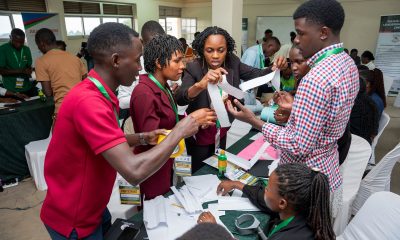

UNDP and JNLC hold training in Fort Portal: Participants equipped with skills in Advocacy and Gender Equality, Team Building, Inclusive Leadership, and Financial Literacy
-


College of Humanities and Social Sciences Launches Five Groundbreaking Publications
-
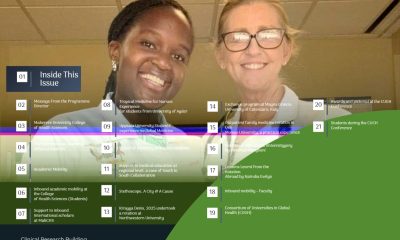

International Coordination Office Newsletter, Issue 1 Jan–Jun 2025
-
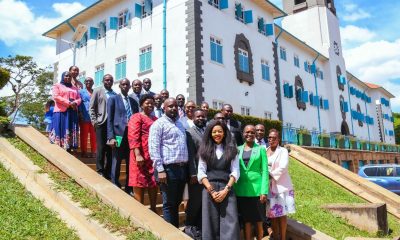

Makerere University Hosts Ambassador Judyth Nsababera for Strategic Dialogue Advancing Uganda–China Engagement
-
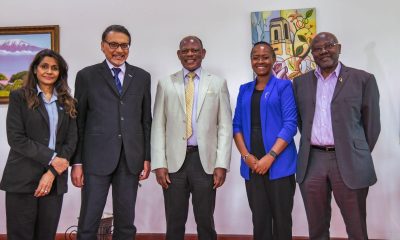

Strengthening South-South Academic Partnerships: Makerere University and Binary University Chart a Strategic Path for Innovation, Entrepreneurship and Women’s Leadership
-
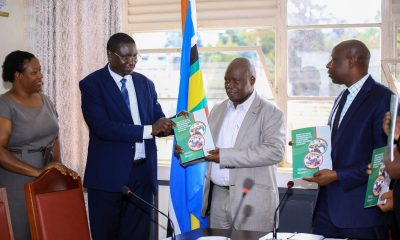

Makerere University and Ministry of Public Service Study Reveals Impact of Salary Enhancement on Teacher Performance in Uganda
Humanities & Social Sciences
Meet Najjuka Whitney, The Girl Who Missed Law and Found Her Voice
Published
4 days agoon
February 23, 2026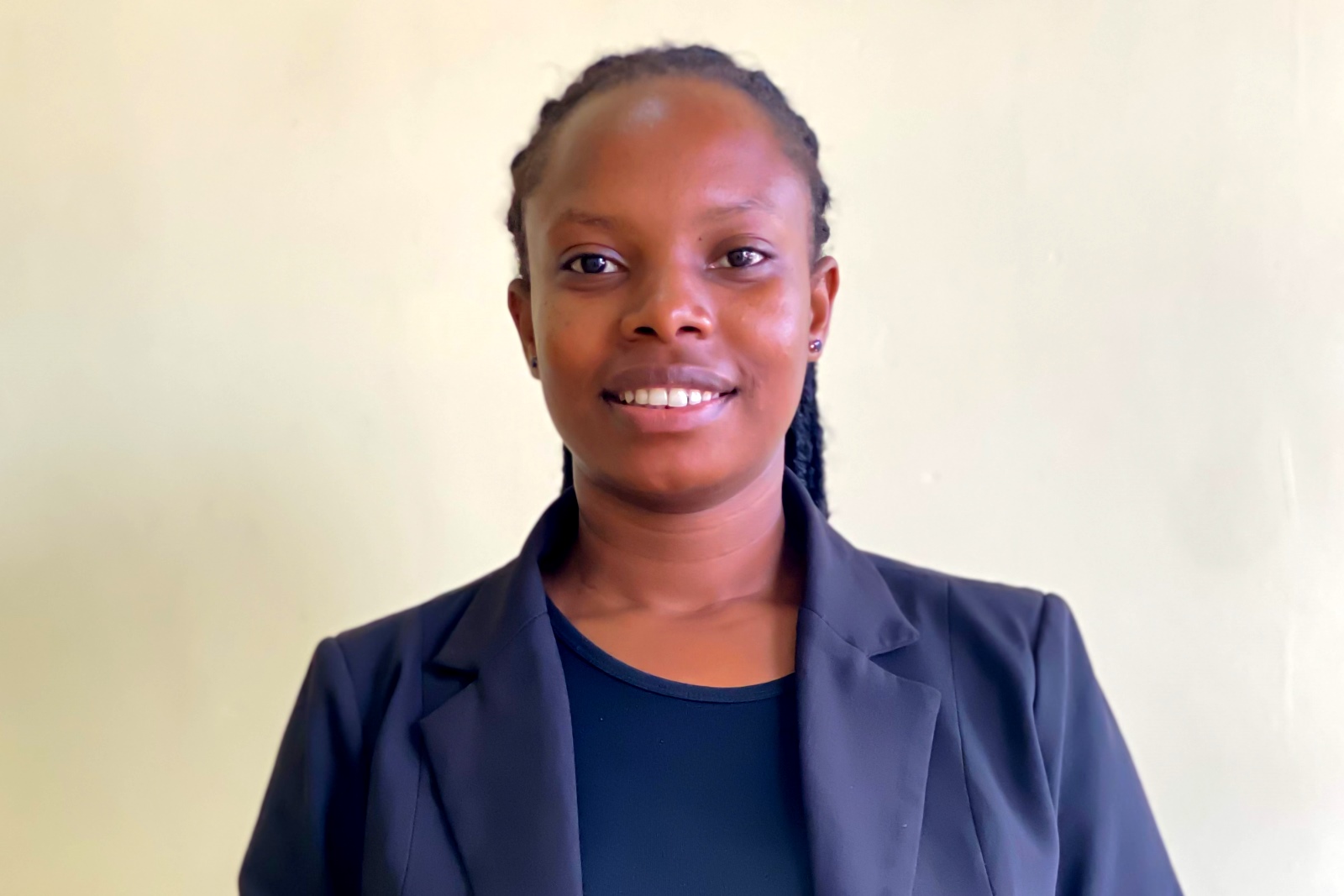
On the morning of Friday, February 27, when the academic procession winds its way across Makerere University’s Freedom Square for the last day of the 76th Graduation Ceremony, Whitney Najjuka will walk into history with a number beside her name: 4.46.
At Makerere, that number means First Class Honours. It means the Vice Chancellor’s List. It means she graduates as the only First-Class student in Journalism and Communication this year. But numbers, as Whitney has learned, rarely tell the full story.
Born on March 27, 2002, in Nabbingo, Kyengera Town Council, to Margaret Kusemererwa and Fred Kasirye, dreamt she would do Law, one of the disciplines, prestigious, almost inevitable next steps for a student who had excelled in secondary school. She had done everything correctly. Studied hard. Scored well. Followed the script.
But Makerere University had other plans. She missed the pre-entry mark, but found her name under Journalism and Communication, another prestigious course offered by the Journalism and Communication Department at Makerere University.
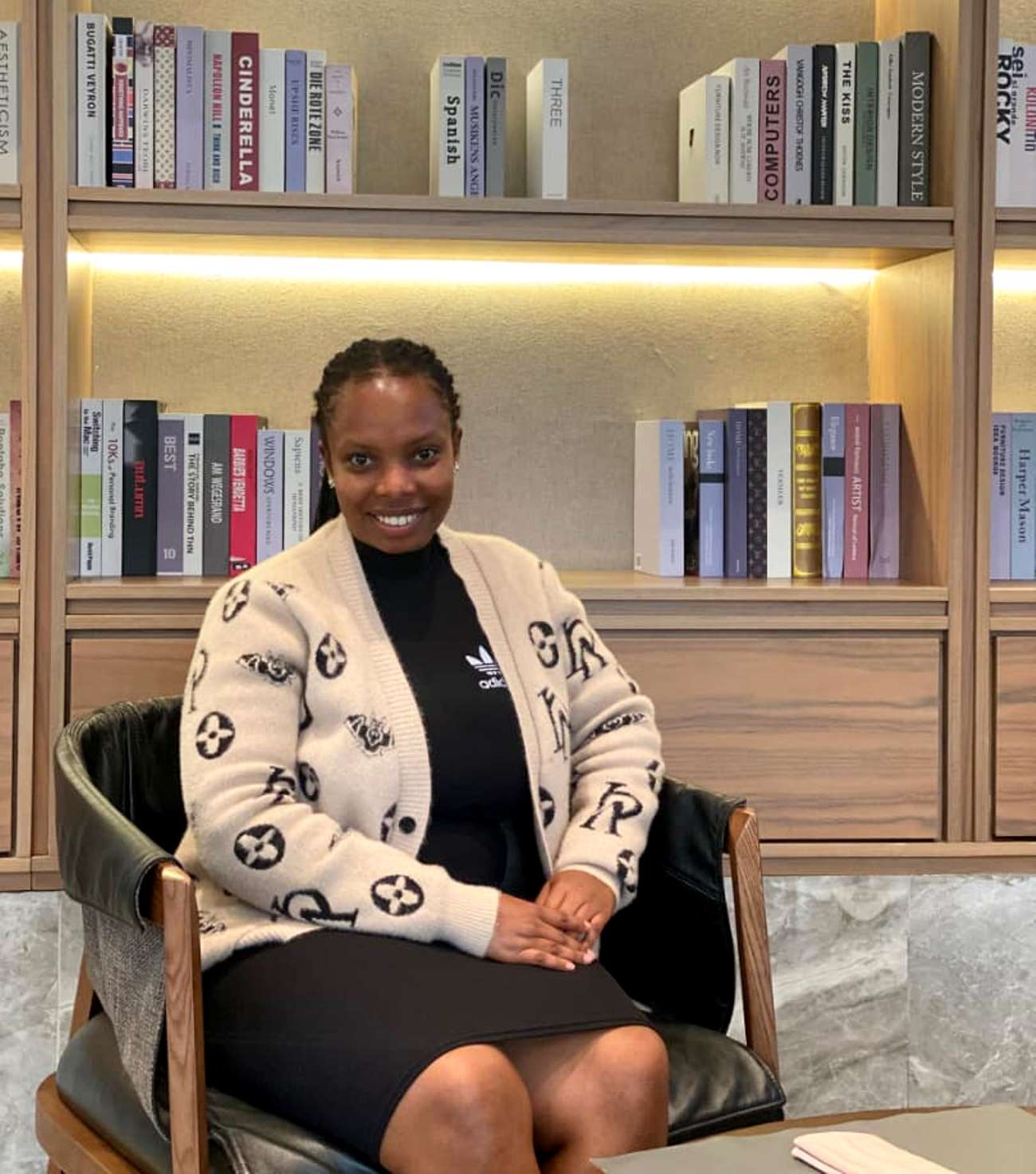
Najjuka began her academic journey at Muto Primary School in Buwama, earning 8 aggregates in the Primary Leaving Examination, a performance that positioned her strongly for secondary school.
She would later join St. Lucia Hill School, Namagoma, where she earned 20 aggregates at O-Level and 17 points in History, Luganda, and Divinity at A-Level.
Missing her dream course, Law, felt at first, like a detour. But Whitney was encouraged by Sanyu Christopher, her uncle, and she settled for a government-sponsored slot in the Bachelor of Journalism and Communication at Makerere, which she had applied for before.
She entered uncertain. But she graduates transformed.
The Pivot That Became a Purpose
Whitney speaks of her early university days with candor. She did not arrive at the Department of Journalism and Communication with a burning childhood ambition to be a journalist, but because another door had closed.
Then, Social and Behavior Change Communication happened. Applied Strategic Communication happened. She began to see media not as headlines and microphones, but as architecture, shaping how societies think, argue, and act.
The turning point came in her third year. The Female Journalist Foundation published her story on Sexual Gender-Based Violence (SGBV) and its emotional toll on survivors. What startled her was not its publication but the reaction. Comments flooded in. Debates ignited, especially about the role of men in combating GBV.
“I realized media doesn’t just report,” she says. “It frames how society views a crisis.”
Her voice, once tentative, had entered a national conversation.
The Discipline Behind 4.46
At Makerere University, a First Class CGPA is not built on brilliance alone but on ritual.
Whitney’s ritual began with showing up, on time, every time. She treated lectures as appointments with her future self. She refused to confine her learning to the syllabus. While attending workshops at the Aga Khan Graduate School of Media and Communication and obtaining external certifications, she sought and was open to mentorship through the Public Relations Association of Uganda (PRAU).
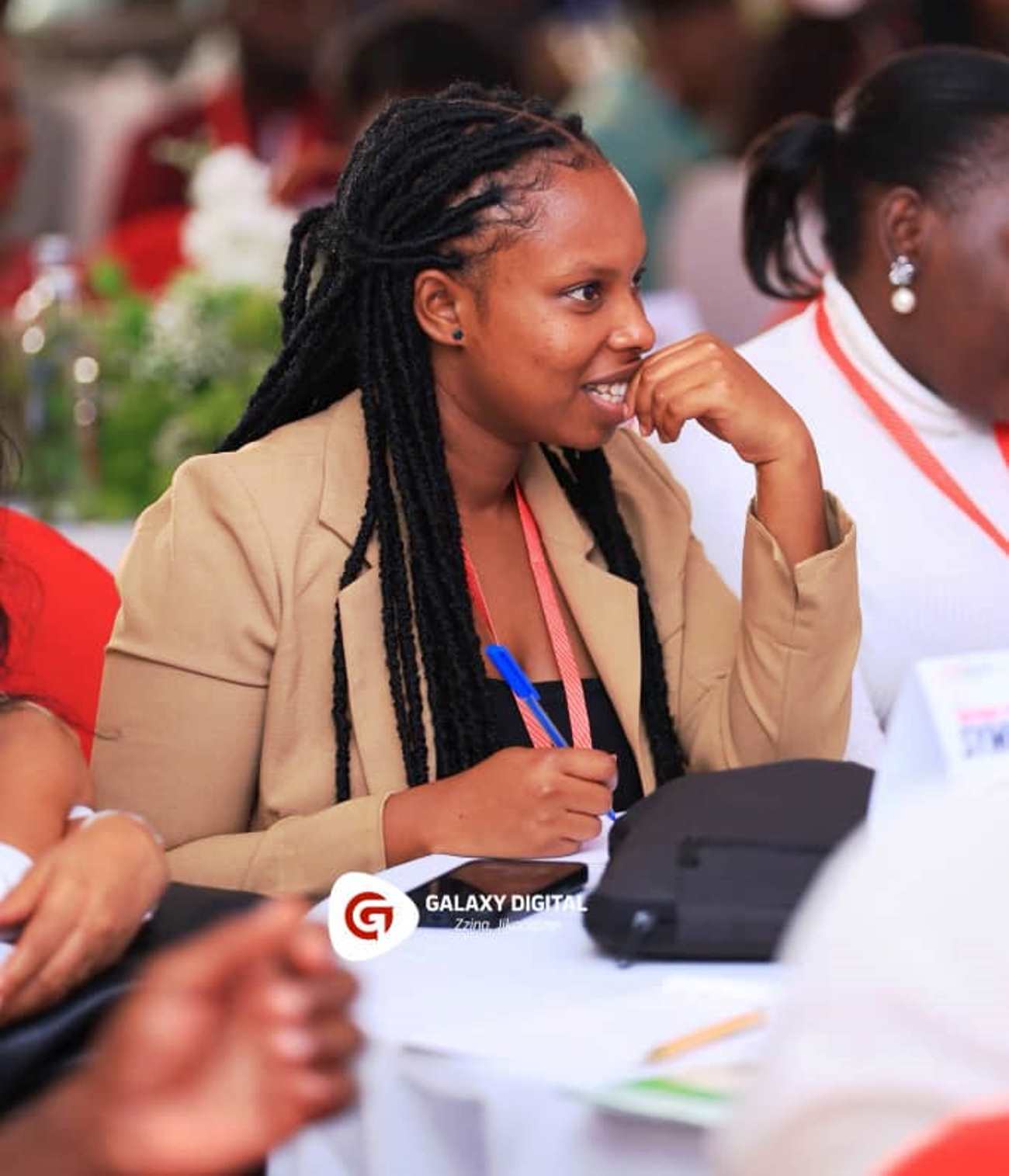
She wanted theory anchored in practice. And then there was the commute.
From Nabbingo, a hill in Wakiso District, some 18.6 km to Kampala, where the Makerere Main campus is situated, and back, nearly 20 hours a week dissolved into Kampala traffic. Two-hour journeys before 8:00 a.m. lectures. Dust. Noise. Headaches. She learned to manage energy the way others manage time. Fatigue became a tutor in resilience.
“I had to be intentional with every remaining hour,” she says. “Excuses were not an option.”
Learning to Practice Communication
If classrooms taught her analysis, presentations taught her courage. Pitching projects, defending research, and standing before peers quick to critique forced her to think on her feet. She was no longer simply studying communication; she was practicing it.
In 2024, the AGMES Fellowship at the Aga Khan Graduate School of Media and Communication pushed her further. She received funding to produce a capstone project on the mental impact of gender-based violence on survivors. She identified sources, conducted interviews, handled trauma with care, and worked with professional editors.
The Communication, she learned, is logistics and ethics as much as eloquence.
The Future She Sees
Whitney is optimistic about Uganda’s media landscape. The digital shift, she believes, has democratized influence. Young communicators are no longer confined to legacy newsrooms or offices.
Yet she sees a gap in the absence of structured research on sustainable, ethical, profitable independent media ventures in Uganda. Her ambition is not only to practice communication, but to study it. To produce data-backed frameworks that help young Ugandans transition from graduates to media entrepreneurs.
She wants to make the impact scalable.
What Remains
As the only First-Class graduate in her cohort, she is careful not to mythologize herself. “Success isn’t brilliance alone,” she says. “It’s a daily commitment when nobody is watching.”
Even before graduation, Whitney had stepped into the industry through a mentorship internship at Capital One Group (COG EA Ltd), a strategic marketing communications agency operating across East Africa.
At Capital One Group, we spoke to Paul Mwirigi Muriungi, the Managing Director and Head of Strategy, who spoke of Najjuka as a progressive and intentional young professional who approaches her work with curiosity, maturity, and responsibility.
“Her attitude is exemplary. She is teachable, receptive to feedback, and eager to grow. While technical skills can be taught, character, work ethic, and mindset determine long-term success, qualities that Whitney consistently demonstrates. Given her academic excellence and professional application, we believe she has a bright future both at Capital One Group and within the wider communications industry. She represents the kind of talent the profession needs: thoughtful, adaptable, and committed to excellence.
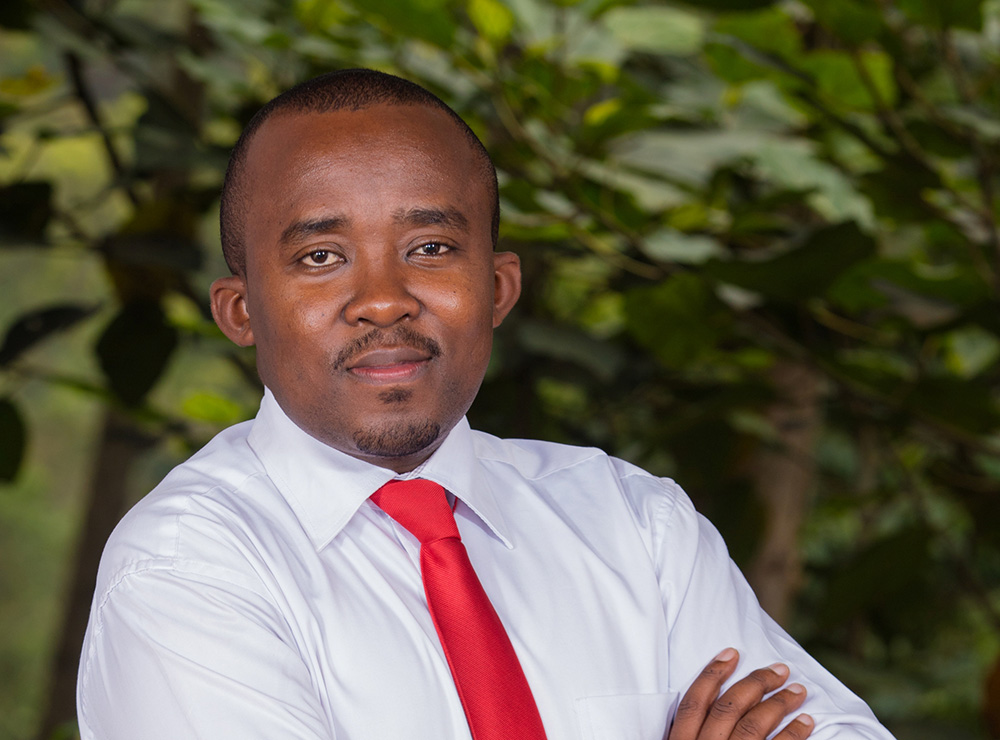
“We look forward to seeing her next chapter unfold,” says Mwirigi.
Najjuka’s gaze extends beyond her own trajectory. She speaks of what the Department could become. Furnished and equipped with industry-standard equipment, newsroom simulations, and deeper investment in data journalism as prayers. Her excellence is not self-congratulatory, but it is forward-looking.
“The University should support the Department to procure industry-standard equipment. Access to high-quality cameras, sound booths, and updated editing software like Adobe Creative Suite is critical to our learning environment,” she says.
Adding that, “We need a newsroom simulation, a physical or digital space where students work under real-time deadlines to produce content for the public. That would prepare us for industry and even strengthen the University’s own media platforms.”
In an era defined by metrics, algorithms, and digital traceability, data journalism is no longer a niche skill but a sine qua non of credible reporting. “There should also be more focus on data journalism and search engine optimization. These are no longer optional skills. Students would benefit immensely from stronger training in these areas.”
Dr. Aisha Nakiwala, the Head, Department of Journalism and Communication, says the faculty are very proud that she is graduating with a First Class—the only one in this year’s cohort.
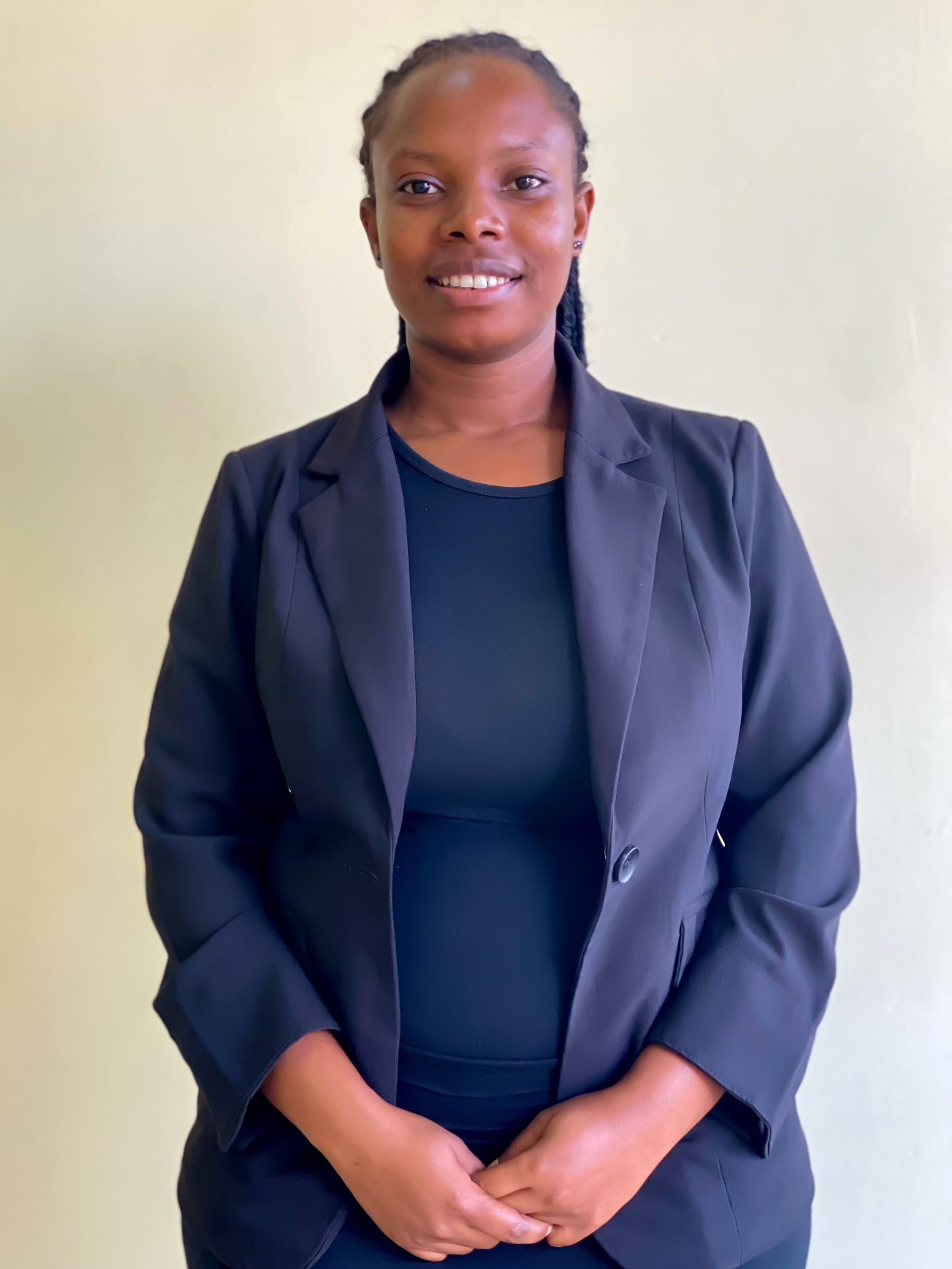
“This achievement reflects not only exceptional intellectual ability but also discipline, resilience, and sustained dedication to the highest standards over four years. Graduating with first-class honors is no small feat; it requires consistent outstanding performance.
“Her accomplishment sets a powerful example for continuing students and reaffirms our department’s commitment to nurturing excellence. We are confident she will make meaningful contributions to the communication profession and society at large,” says Dr. Nakiwala.
On graduation day, applause will crest and recede. The gowns will fold back into wardrobes. The transcripts will be filed away in cabinets. But something quieter will endure; a young woman from Nabbingo who once missed her Law mark, who spent 20 hours a week on the road, who discovered that storytelling is power, and who now walks into Freedom Square not by accident, but by intention.
Life, as she has come to understand it, lives on.
Humanities & Social Sciences
Dr. Pamela Khanakwa Honored for Steering Record 18 PhD Candidates for the Mak 2026 Graduation
Published
1 month agoon
January 23, 2026By
Jane Anyango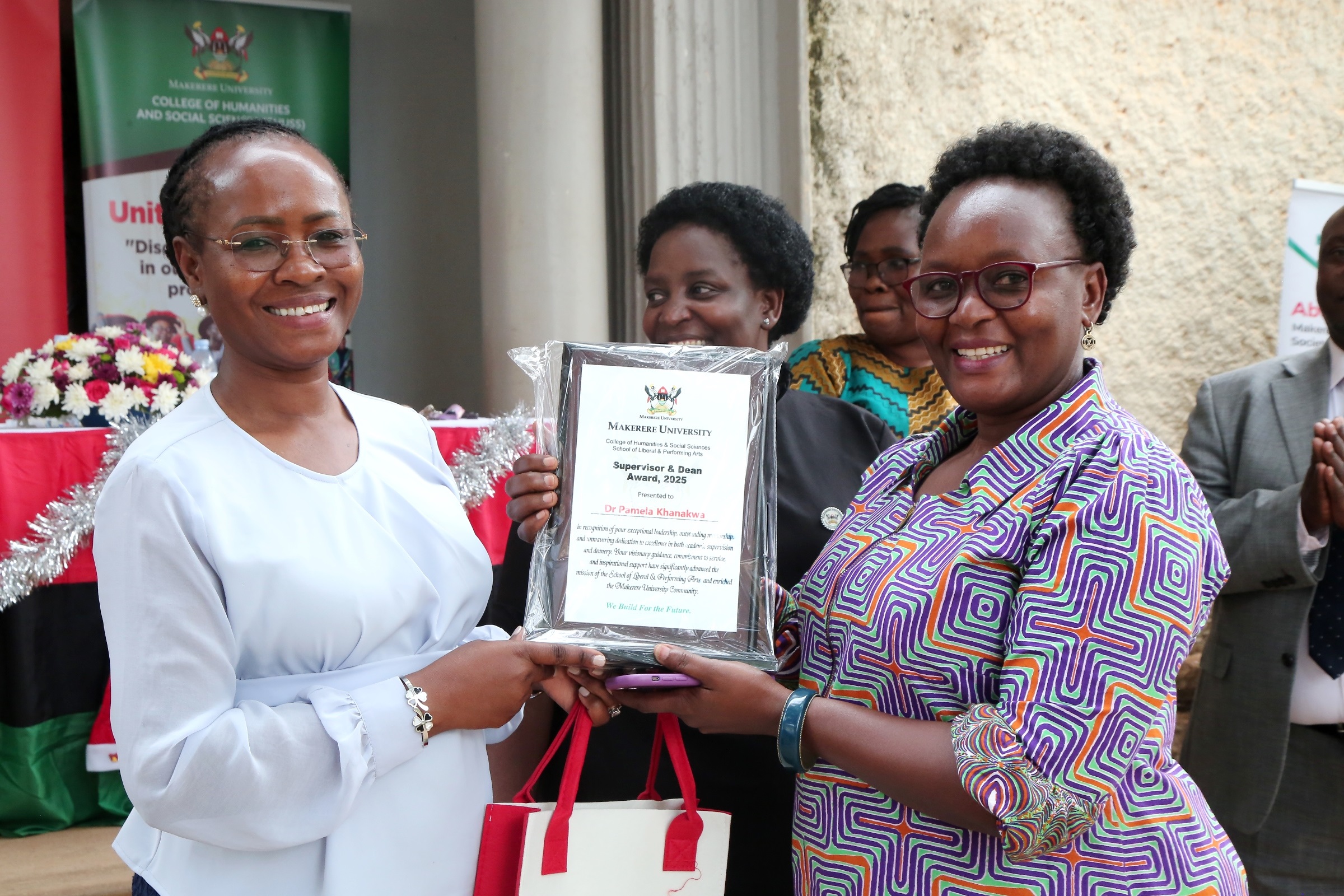
Six personally supervised, three completed in record time, as School of Liberal and Performing Arts sets a historic milestone. Dr. Pamela Khanakwa got the Award as Best PhD Supervisor and Dean
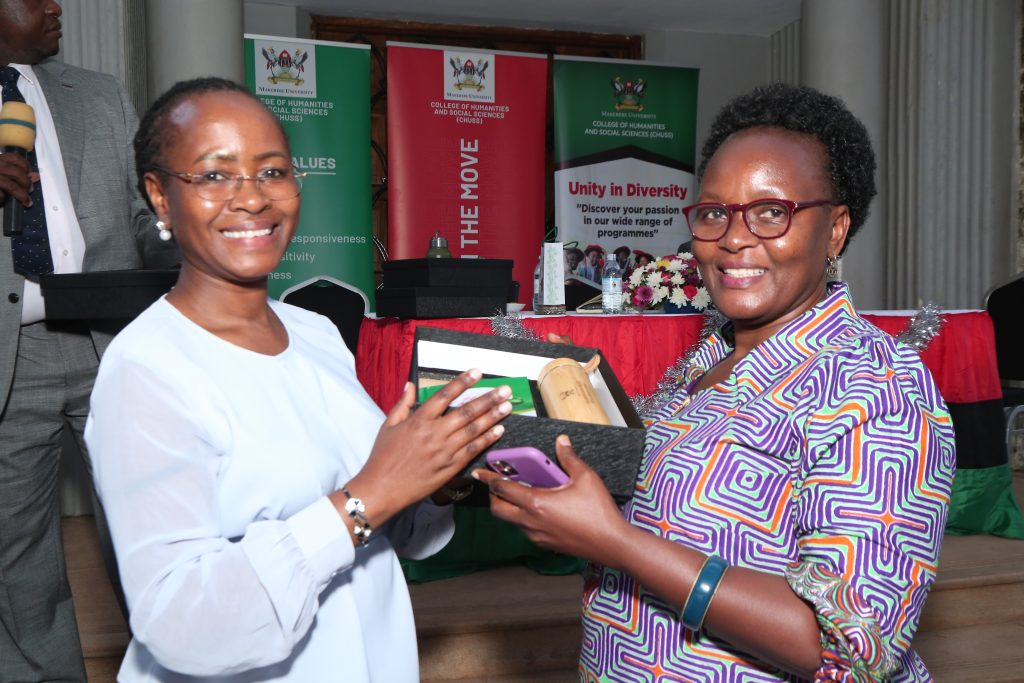
A Historic Academic Milestone for SLPA
The College of Humanities and Social Sciences (CHUSS) recognised the Dean of the School of Liberal and Performing Arts (SLPA), Dr. Pamela Khanakwa, for outstanding academic leadership that has seen the School field 18 PhD candidates for the next 2026 Makerere University Graduation Ceremony scheduled for 24th-27th February. Remarkably, six of these doctoral graduates were directly supervised by Dr. Khanakwa, with three completing within the official three-year timeframe, an exceptional achievement in graduate training. The recognition was announced during the CHUSS End-of-Year Get-Together, where staff applauded Dr. Khanakwa’s dedication, humility, and relentless commitment to postgraduate supervision and timely completion.
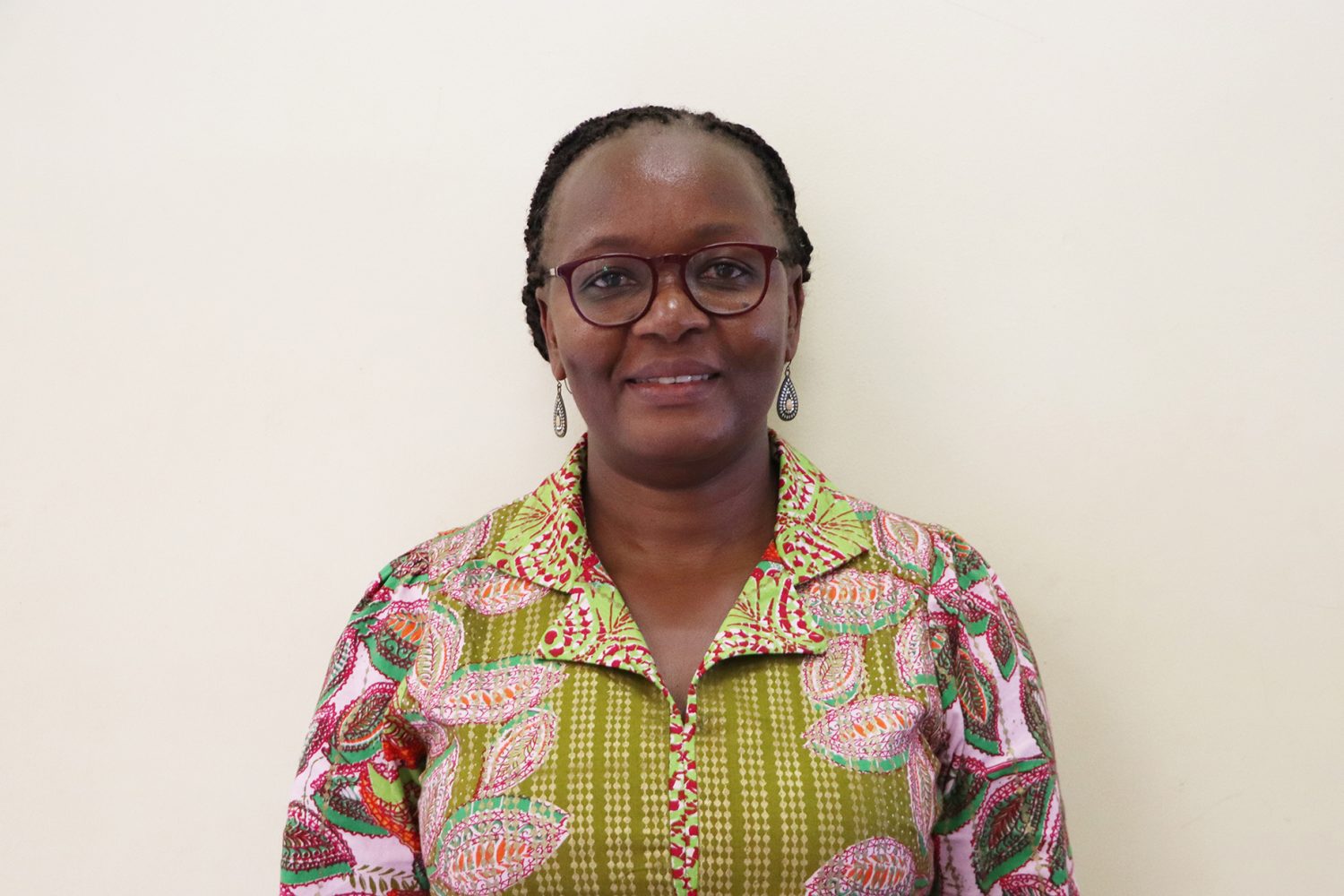
Message to Academic Staff
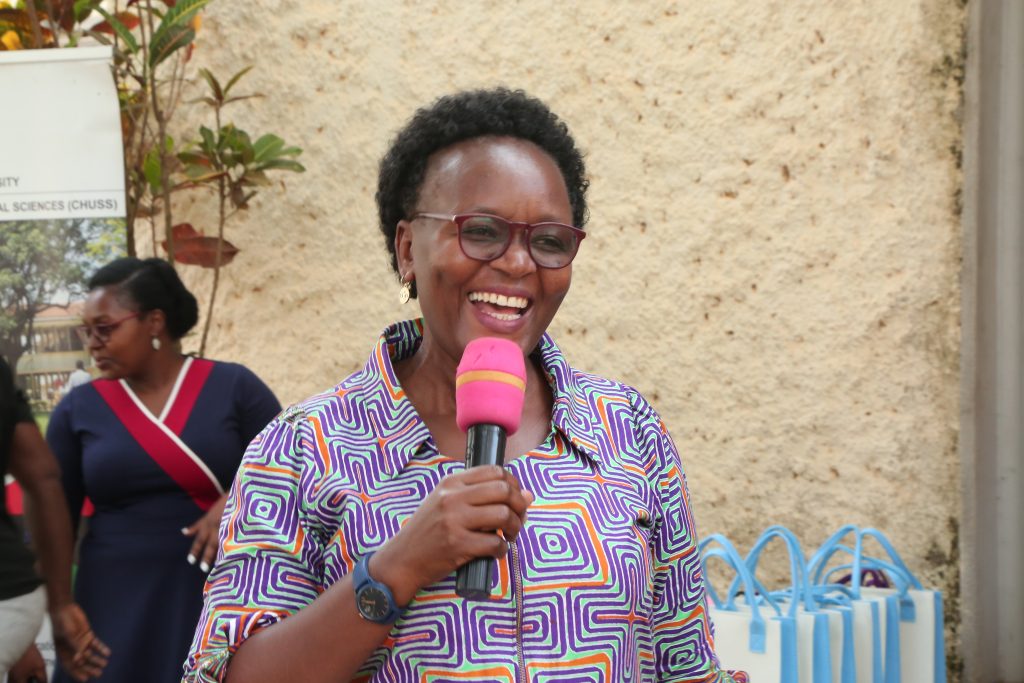
Q: What message do you have for your staff following this achievement?
Dr. Khanakwa:
First, I celebrate my staff and thank them for their dedication to supervision and student support. Academic work is demanding, and material rewards are often limited, but the true satisfaction comes from seeing students succeed.
I encourage my colleagues to remain committed. Yes, the workload is heavy, but many things are possible with dedication and teamwork. Let us continue working for the good of our students, our School, and Makerere University.
Leadership Rooted in Humility
Q: Many colleagues describe you as humble, down to earth, and hardworking. What shapes this character?
Dr. Khanakwa:
I think it is largely my upbringing. My mother was a primary school teacher from the 1950s until the mid-1980s. She worked extremely hard to raise us, combining teaching with farming to ensure we had school fees and basic needs. From her, I learned humility, discipline, and the value of hard work.
I also learned that leadership positions are temporary. You occupy them today, and tomorrow you move on. So humility is essential.
My graduate training also shaped me significantly. My PhD supervisor emphasized that graduate study is a full-time job and that results matter more than noise. Let people see your work through outcomes, not announcements.
Supervision as a Two-Way Commitment
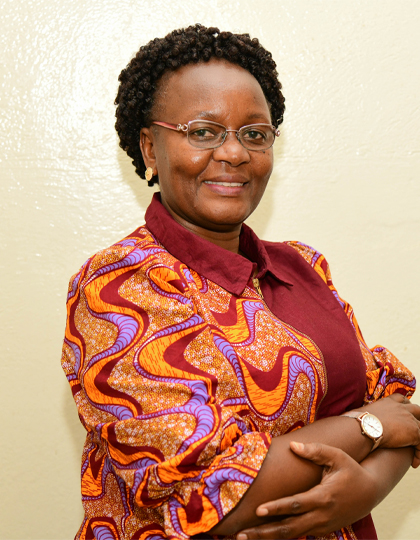
Q: How would you describe your supervision style?
Dr. Khanakwa:
I read my students’ work thoroughly, word by word. Sometimes my comments are tough, but they are honest. Supervision is a two-way commitment. I give feedback, but students must also respond and remain engaged. When that relationship works, progress happens.
Balancing Leadership, Scholarship, and Family
Q: How do you balance being a Dean, scholar, wife, mother, and daughter?
Dr. Khanakwa:
Honestly, I am not sure I balance perfectly. My mother lives far away in Bukwo, so visiting requires careful planning. My children grew up understanding the demands of academic life. I pursued my PhD in the United States and spent long periods away, but we adapted as a family.
Work has become part of my lifestyle. I use weekends to read dissertations, review manuscripts, and write. Sometimes my children ask if I ever sit without working, but this is the commitment I made. As we often say jokingly, “We humbly applied for the job, so let us do the job.”
Scholarship Beyond Supervision
Dr. Khanakwa is also an active scholar and editor. In the past year alone, she has:
- Edited scholarly volumes on archives, memory, method, and pedagogy
- Published a book with Routledge Companion
- Co-authored journal articles and book chapters with graduating students, including Priscah Asiimwe and Anatoli Lwasa Mpijja
“I feel an obligation to write with students,” she notes. “It takes time, energy, and commitment, but it is part of academic mentorship.”
Who Is Dr. Pamela Khanakwa?
Dr. Pamela Khanakwa is the Dean, School of Liberal and Performing Arts, College of Humanities and Social Sciences, Makerere University. She is a seasoned scholar, supervisor, administrator, and mentor whose leadership continues to redefine graduate training excellence. Details about Dr. Pamela Khanakwa can be accessed at: https://chuss.mak.ac.ug/en/personnel/pamela-khanakwa/
More details are available in her attached curriculum vitae.
The CHUSS End- Of-Year-Get-Together
On 12th December, 2025 the college leadership organised a get-together end of year gathering to take stock of the achievements, challenges and brainstorm together on how to move forward. The event was marked by entertainment, team building games, appreciation speeches, sharing a meal and a Christmas package for every staff
Retirees and staff recognised
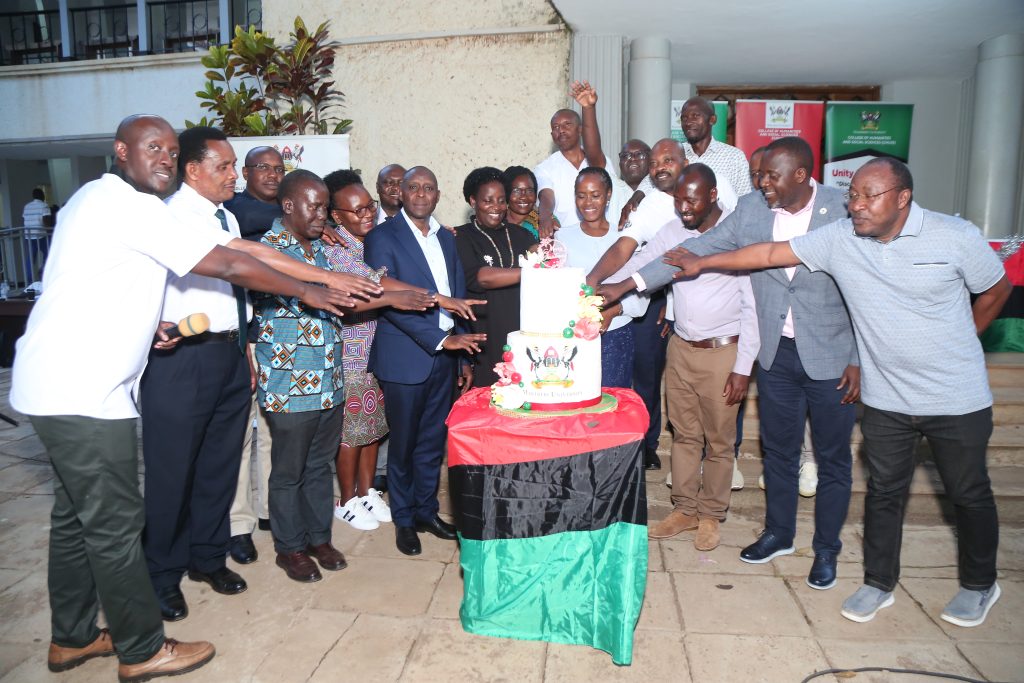
Five retired staff Dr. Micheal Wangotta Masakala, Dr. Anatole Kirigwajjo and Dr. Jackson Kizza Mukas (all from the School of Languages, Literature and Communication), Assoc. Prof. Florence Nansubuga (School of Psychology), Dr. Tusabe Gervase (School of Liberal and Perforing Arts) and Ms. Scovia Nganda Sekweyama (secretary from the School of Social Sciences) were recognised for their dedicated services to the university.
In addition to Dr. Pamela Khanakwa’s Award as Best PhD Supervisor and Dean, Ms. Birabwa Florence scooped the award of Best Registrar of the year. Birabwa is the registrar for the School of Liberal and Performing Arts.
Administrative and support staff including Ms. Mary Gyezaho and Annet Kashumbusha(both administrative secretaries in the Principals office), Farouq Lule (IT Officer), Godfrey Kakooza (cleaner), Charles Sebuguzi (driver) and Jane Anyango (Communications officer) were recognise with awards for outstanding service. Dr. Mohamed Mayanja Kajumba was from the School of Pyschology was recognised as the person with an outstanding talent in Handwriting.
The celebrations held in the Arts quadrangle were graced by the Vice Chancellor Academic Affairs Prof. Sarah Ssali and the Deputy Vice Chancellor in charge of Finance and Adminstration Prof. Ireeta Tumps.
Humanities & Social Sciences
Ugandan Journalists Trained on Peace and Gender-Sensitive Reporting Ahead of 2026 Elections
Published
2 months agoon
January 9, 2026By
Jane Anyango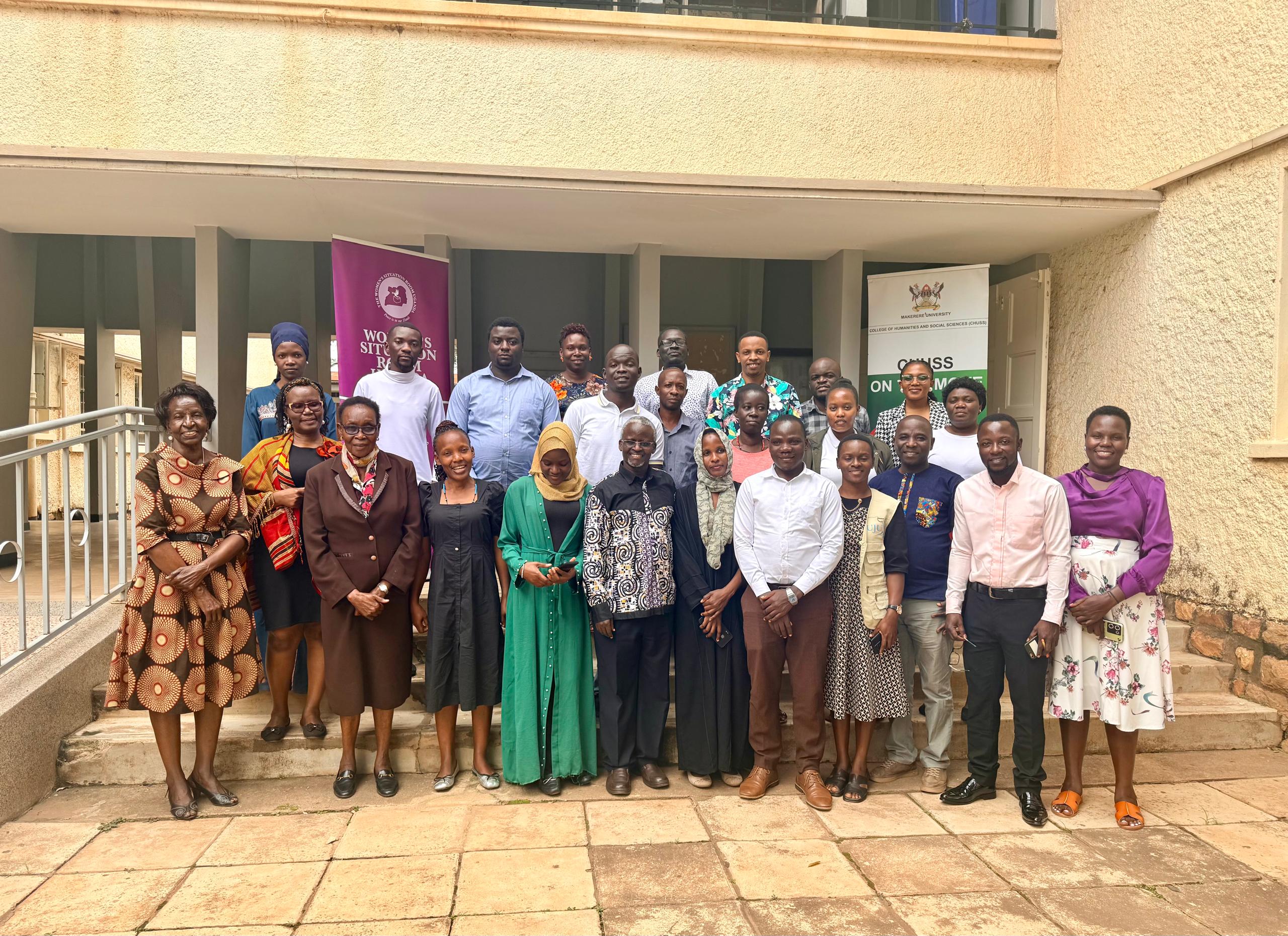
Kampala, Uganda – January 9, 2026
Ahead of the January 15 general elections, Ugandan journalists have undergone specialized training on peace and gender-sensitive reporting to ensure responsible media coverage during the election period. The two-day training, held from 8th to 9th January 2026 at Makerere University’s College of Humanities and Social Sciences Smart Room, was organized by the Women’s Situation Room (WSR) in partnership with various stakeholders and brought together journalists from across print, broadcast, and online platforms.
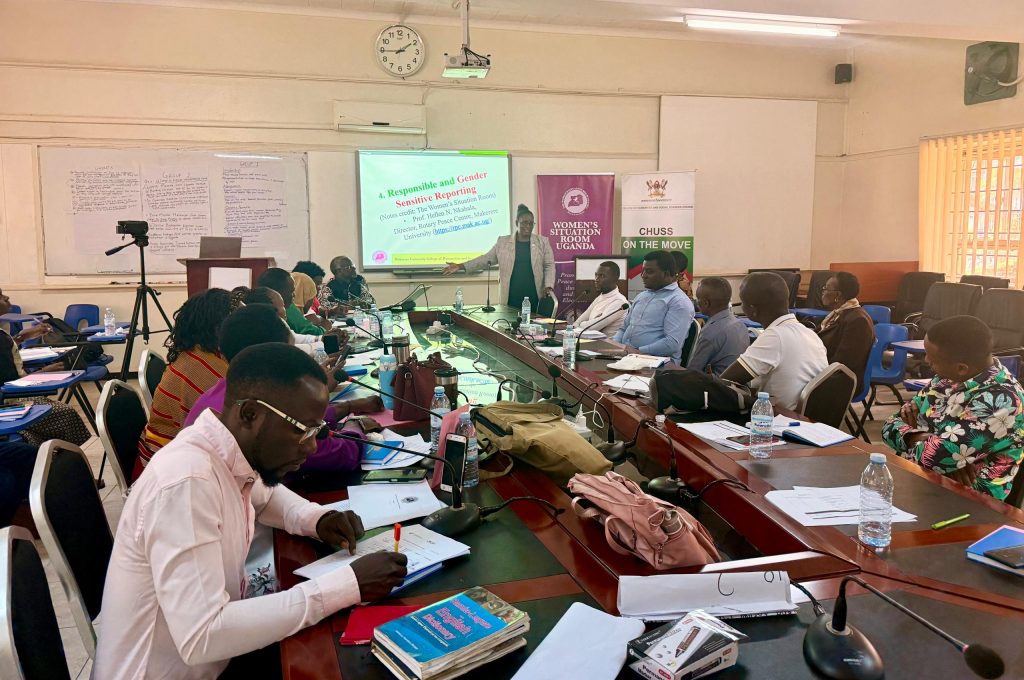
The main objective of the training was to strengthen the capacities of media in reporting and documenting electoral processes in a responsible and gender-sensitive manner. The specific objectives included: strengthening journalists’ skills to cover the 2026 elections in a fair, balanced, gender-sensitive, and non-violent partisan way; enhancing the role of media to enable citizens to be well-informed and actively participate in the election process; ensuring focused and balanced reporting on peace during and after elections; and strengthening partnerships between the WSR and media houses during the election period.
The training covered multiple critical modules. Day one focused on responsible conflict-sensitive reporting, emphasizing principles such as balance, impartiality, and accuracy. Participants explored the role of media as a relayer of the population’s voice, election monitor, catalyst for social cohesion and reconciliation, contributor to the accountability of political actors, and a platform for detecting and debunking digital media misinformation and hate speech.
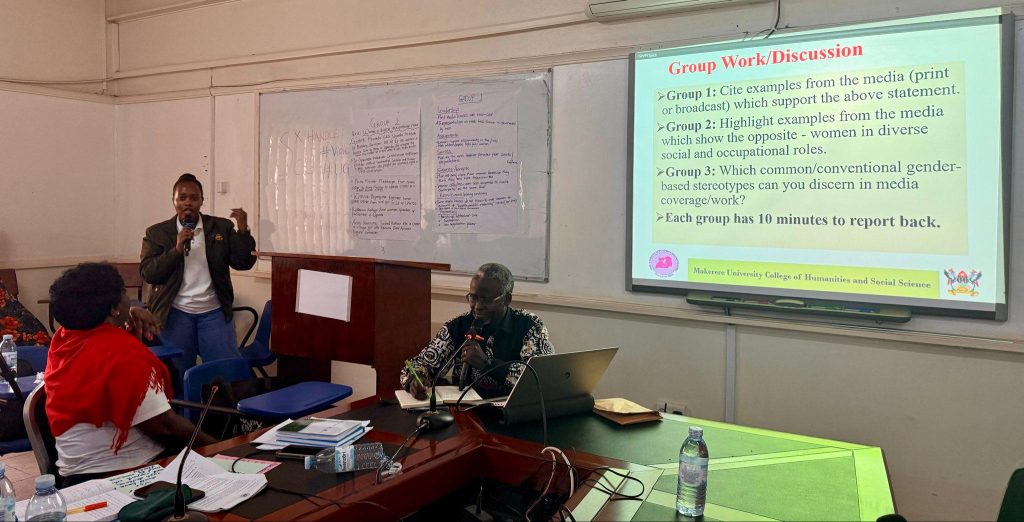
Day two addressed responsible and gender-sensitive reporting. Key aspects included the definition of gender-sensitive reporting, how to become a gender-sensitive reporter, critical elements in reporting with gender awareness, packaging gender-sensitive stories, and a checklist for detecting and avoiding gender-insensitive reporting.
Her Lordship, retired Judge Justice Mary Mayitum, emphasized the importance of peace as the foundation of development and democratic engagement. “Because we value peace more than anything. Without peace, really, you can do nothing. But where there is peace, you can have time to reflect, discuss with others, and join in meaningful dialogue,” she said. She warned that the country’s past conflicts, such as those in Gulu, underscored the necessity of maintaining national harmony.
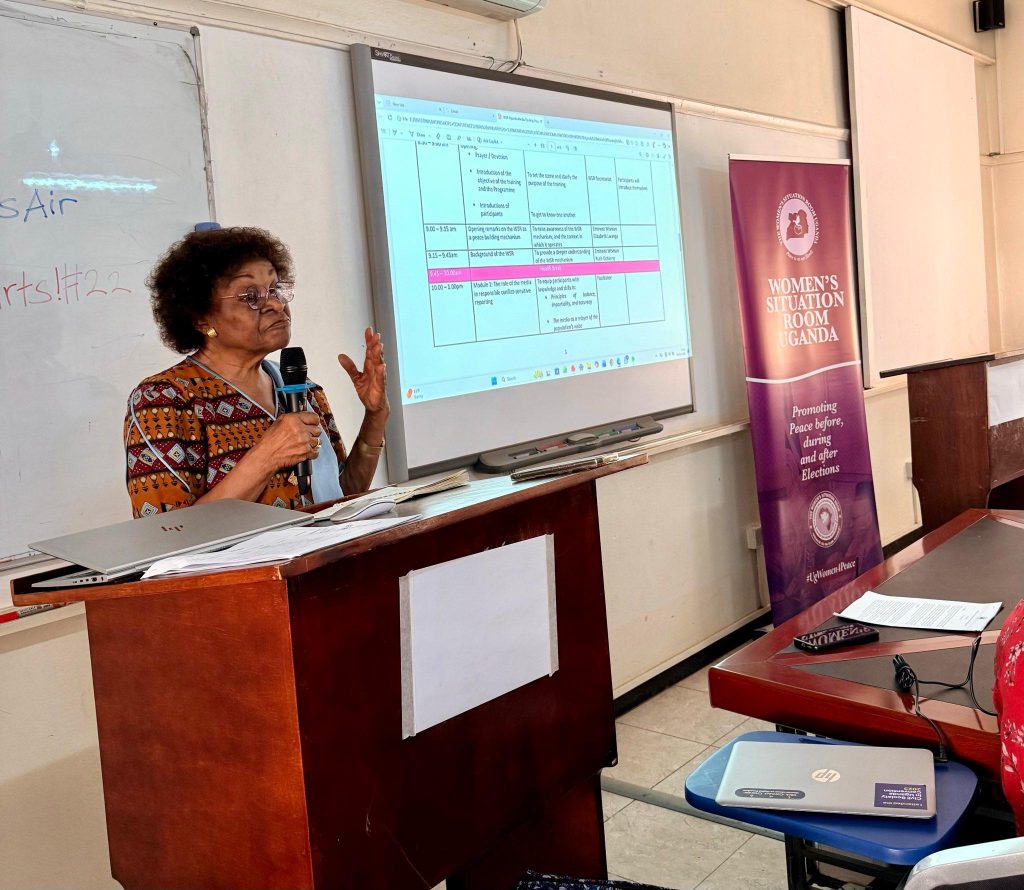
Justice Mayitum also urged other key election stakeholders to uphold peaceful conduct. “Being peaceful is the very heart of life. We have spoken to police, security personnel, political parties, and the Electoral Commission. We want politicians to have a code of conduct and to understand that it’s okay to think differently without fighting or hating one another,” she added.
Dr. William Tayebwa, lead facilitator and senior lecturer in the Department of Journalism and Communication at Makerere University, said, “This training is about conflict-sensitive reporting, peace journalism, and gender-sensitive reporting in the context of the elections. The emphasis was on giving female political candidates a voice while ensuring journalists report responsibly on election-related matters.”
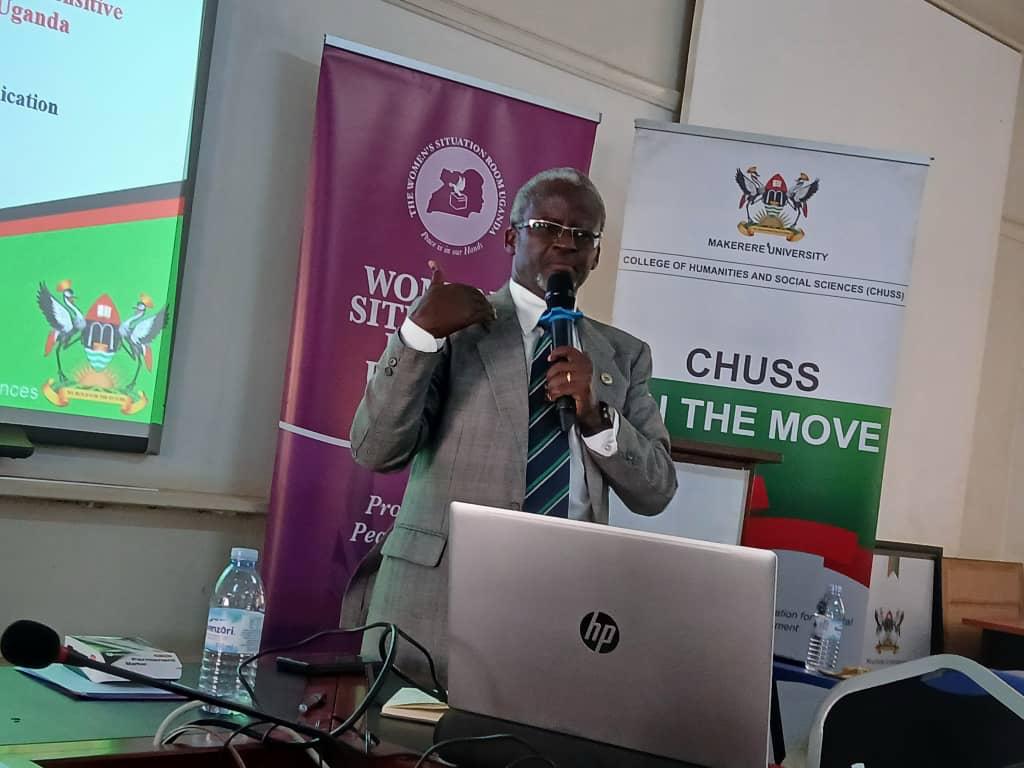
Participants described the training as timely and impactful. Tony Banizengabo of CBS Wakiso District said, “We’ve benefited a lot. We’ve been trained to write stories which bring peace, not conflict. Ahead of the elections, we are very ready to be part of peacemakers.”
Dorcas Kimono of UBC TV Kampala added, “It was so timely and rich. We learned how to report without promoting or fueling violence, giving voice to victims without angering them or encouraging violators. This is very vital, especially as we approach the 2026 elections.”
The training aims to equip media personnel with the knowledge and skills to uphold professional ethics while contributing to a peaceful, inclusive, and gender-sensitive electoral process.
Trending
-

 Humanities & Social Sciences4 days ago
Humanities & Social Sciences4 days agoMeet Najjuka Whitney, The Girl Who Missed Law and Found Her Voice
-

 Health1 week ago
Health1 week agoUganda has until 2030 to end Open Defecation as Ntaro’s PhD Examines Kabale’s Progress
-

 Agriculture & Environment7 days ago
Agriculture & Environment7 days agoUganda Martyrs Namugongo Students Turn Organic Waste into Soap in an Innovative School Project on Sustainable Waste Management
-

 General1 week ago
General1 week agoMastercard Foundation Scholars embrace and honour their rich cultural diversity
-

 General3 days ago
General3 days ago76th Graduation Highlights
